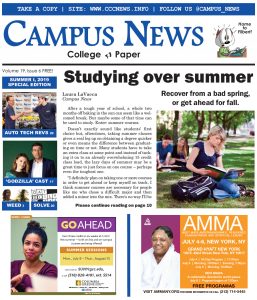By Laura LaVacca
Campus News
After a tough year of school, a whole two months off baking in the sun can seem like a welcomed break. But maybe some of that time can be used to study. Enter: summer courses.
Doesn’t exactly sound like students’ first choice but, oftentimes, taking summer classes gives a real leg up on obtaining a degree quicker or even means the difference between graduating on time or not. Many students have to take an extra class at some point and instead of tacking it on to an already overwhelming 15 credit class load, the lazy days of summer may be a great time to just focus on one course – perhaps even the toughest one.
“I definitely plan on taking one or more courses in order to get ahead or keep myself on track. I think summer courses are necessary for people like me who chose a difficult major and then added a minor into the mix. There’s no way I’ll be able to complete the required credits for both just within the 8 semesters given,” Adelphi student Imani Bempong explains.
Want affordable summer credits in New York State, available online? Try:

There are definitely a few things students need to keep in mind when deciding to enroll or not. Firstly, summer courses are divided into sessions, typically three. Each session is about a 3-4 week period. Therefore, courses are condensed because fall and spring semester courses are about 15 weeks in length. This can prove to be a quick way to get new material under students’ belts or a recipe for disaster. Very difficult courses can be hard to grasp in such a short time, but, conversely, the intense focus on a subject matter can prove to be a great way to engulf oneself in a subject and retain the material.
It can also prove to be a way to fall behind since the classes are quickly paced and professors often move on to the next lesson without always giving ample time to the previous. In this case, students should weigh their own study habits, academic abilities and choose summer classes wisely.
Nassau Community College professor Jen Southard notes, “Students need to be prepared for completing a semester’s worth of work in just a few weeks, meaning that they are probably going to spend a few hours a day outside of class reading and completing assignments.”
In addition, there are other factors to consider: “The only qualm I have is that summer courses tend to be expensive. The costs are entirely out of pocket; no financial aid from the semester carries over. Some of us rely heavily upon financial aid to make it through school,” Bempong gripes.
Most institutions do not offer financial aid or loans for summer classes unless the student is enrolled in a certain number of classes, usually full-time status. Students are left paying out of pocket to complete classes or turning to a bank for a loan. Interest rates on bank loans can be astronomical and paying cold hard cash for credits is difficult when some schools like Hofstra University charge $1500 per undergraduate credit (compared to as low as $170 for an online community college credit). Hofstra also has a policy in place that prevents students from taking class at another college if they are within driving distance from Hofstra: “Students may obtain credit on their Hofstra records for courses taken in the summer session at another accredited institution if the other institution is not within reasonable commuting distance of Hofstra and if the courses have been approved in advance.” Other colleges may have similar rules in place so students need to research before paying serious dough for courses that may not even transfer.
Want affordable summer credits in New York State, available online? Try:
If the idea of being in school for extra time isn’t your thing, maybe studying abroad or obtaining an internship will entice you. Schools also offer a chance to gain credit through experiences outside the classroom. For example, this summer study abroad in London, Sussex or Manchester with Stony Brook University’s program — and that’s just to name a few of their offerings. Students can get some summer travel under their belts while also obtaining necessary credits.
Entertaining an internship? Having to balance one with a full course load in the spring and fall can be an arduous task. Check our your college’s career center for any listings and get your hours in in a nice air conditioned setting.
Whatever the case may be, don’t rule out spending some of that extra free time in a meaningful way — at least you’ll avoid sunburn, sand in your food and that Great White that’s been lurking around the Long Island Sound…





Facebook Comments